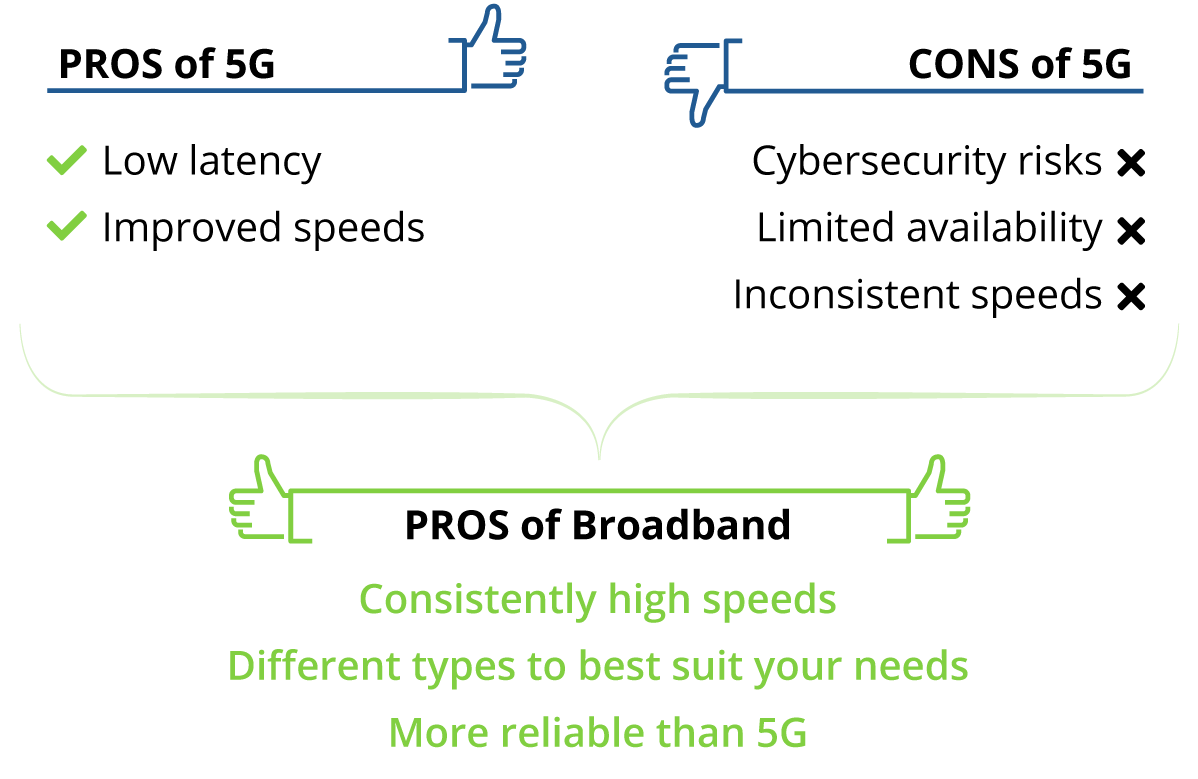5G vs. Broadband Internet: Which Offers a Better Connection for Your Business?
Business Services Connect
In this day of social media, cloud-based software, eCommerce, and viral videos, your online presence is one of the most important aspects of your business. To reach and engage with customers, a fast, reliable Internet connection is a must. Because we all know that slow download speeds or, even worse, an offline WiFi network are a great way to bring business to a halt.
The two primary Internet connection options are 5G and Broadband Internet. Broadband uses various high-speed transmission technologies, such as a fiber-optic cable, while 5G relies on less reliable high-frequency radio waves. 5G utilizes advanced wireless mobile network technology, whereas broadband can transmit data through both wired and wireless technologies.
Find Your Business Providers.
Both options offer unique advantages, but cable broadband is still the better option when it comes to businesses. Understanding how they deliver connectivity can help ensure your business is always connected to those you serve.

What is 5G Internet Connection?
5G refers to the latest generation of wireless technology and is the new global standard for cellular networks. A common misconception is that the “G” stands for gigabit speeds, but it actually refers to the evolution of the technology of wireless networks, which date back to the 1990s. This fifth-generation technology, hence 5G, initially released in 2019, provides higher data speeds (up to 100 times faster) with less delay than its predecessor, 4G LTE. However, it does not match the speeds offered by most broadband connections.
5G technology brings exponential improvements over 4G in capacity, or bandwidth, and its lightning-fast speed eliminates bottlenecks, bringing more download power. Businesses can offer high-quality videos, large downloadable files, and other resource-heavy tasks with low latency or delay, increasing productivity and eliminating frustration.
This latest generation of service relies on wireless signals transmitted through cell phone towers, making it suitable for anywhere/anytime connectivity, assuming it’s available.
Why 5G May Not Be a Good Choice for Business Internet
- Tower proximity: The speed of a 5G connection depends on proximity to a cell tower. Businesses or employees in rural areas may encounter limited or no 5G coverage.
- Inconsistent speed: Smartphones and other mobile devices seamlessly transition from the 5G network to 4G depending on signal strength and available coverage. While switching networks offers stable coverage, the 5G speed gains are lost.
- Network congestion: In areas with high user density, 5G networks may experience congestion, reducing bandwidth for individual users.
- Connection obstacles: 5G connectivity can have line-of-sight issues from obstacles, like buildings or terrain, affecting the quality of the wireless connection.
- Not Reliable: 5G is marketed as a fast alternative to broadband Internet, but it is not yet capable of being as consistent or reliable.
- Cybersecurity Challenges: Even if provided by trusted entities, 5G services have cybersecurity gaps that permit vulnerable attacks from hackers. It not only affects data confidentiality, integrity, and availability, but the likelihood of an attack increases considerably as 5G connects to more devices, resulting in additional investment in security operations to protect your business.
Find Your Business Providers.
What is Broadband Internet Connection?
A broadband connection is a high-speed, always-on connection, allowing fast and efficient data transmission. Early broadband technology relied on phone lines, replacing the slower dial-up Internet connections. Now, broadband users gain high-speed Internet access using one of several high-speed transmission technologies.
Types of Broadband Internet
The following platforms can deliver high-speed, high-capacity broadband Internet service:
Cable broadband utilizes the same coaxial cables that deliver cable television. Cable provides higher speeds than DSL and is widely available.
Fiber broadband, sometimes referred to as fiber-optic, employs thin glass or plastic threads to transmit data using light signals. Fiber Internet is a popular choice among businesses relying heavily on Internet usage.
Wireless service uses radio signals to transmit data, bringing a broadband connection without cables. Fixed wireless access (FWA) is one form of wireless connectivity. FWA replaces broadband Internet’s wired connection with a wireless connection using radio waves through a dedicated wireless link connecting the business to a nearby base station or hub. FWA is often combined with 5G and other broadband technologies to complete the business Internet solution.
Satellite broadband utilizes satellite dishes designed to handle two-way data communication, allowing for uploading and downloading Internet data. Speeds may be slower than DSL and cable modems, and extreme weather conditions can disrupt service. Satellite helps serve remote or sparsely populated areas.
Local Internet Service Providers (ISPs) play a crucial role in determining the broadband connection available. Different ISPs offer various broadband technologies, depending on location, existing infrastructure, and the ISP's service offerings.
Find Your Business Providers.
Which Type of Connection is Best for Your Business?
Before your business decides which type of Internet connection is best, it’s important to take a closer look at the pros and cons of both options:

Below are a few key indicators of why broadband is likely a better Internet option for your business.
Reliability and Stability
- Best choice: Broadband

Speed and Bandwidth
While 5G is faster than 4G LTE, broadband Internet connections can typically beat that speed, especially with fiber connections. With every user vying for bandwidth on your Internet, a robust, high-speed connection is critical.
Broadband connections can range from a few hundred megabits per second (Mbps) to advanced broadband and networking technologies with over 1 gigabit per second (Gbps). The Internet plan you select will depend on the download and upload speeds you need to support your daily operations.
You can conduct an Internet speed test to see how quickly data can be uploaded and downloaded over the Internet and to assess whether the Internet connection meets the expectations set by your Internet plan.
- Best choice: Broadband
Security
Wired connections used for broadband Internet are generally more secure than wireless ones. Although both broadband and 5G can be safe with appropriate security measures, wired connections can be more easily protected with encryption or firewalls. For businesses dealing with sensitive data, this can be a significant advantage.
There are several challenges when it comes to 5G cybersecurity, including a lack of encryption, which increases the likelihood of an attack. Because of this, businesses will need to spend more to enhance the security of their infrastructure.
- Best choice: Broadband

ISP Providers and Plans
Broadband Internet comes with a wider variety of plans and providers, allowing businesses to choose a cost-effective solution to meet their needs. Businesses can shop around for the broadband provider and ISP plan offering the Internet speed, data plans, and bundling options to meet their requirements.
5G is a specific wireless technology limiting the availability of service providers in many areas.
- Best choice: Broadband
Get More for Your Business with Business Services Connect
Like any decision you make as a business owner, you should evaluate all options before selecting your Internet connection. Consider current and future connectivity requirements, available coverage, and costs when determining the best Internet connection.
Let Business Services Connect help you. We've got your business covered with everything from high speeds to secure networking and customized video solutions. Instantly find business Internet, Voice, TV, Mobile, and Network Solution providers in your area.
Business Services Connect — business is better with us.


